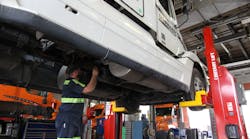Knowing what vehicle maintenance is going to cost each month is one of the main reasons fleets turn to contract maintenance. Most contract maintenance programs are set up based on a fixed monthly fee plus a variable mileage charge.
And while there are lots of options when it comes to contract maintenance, not all programs are created equal. When selecting a provider, look for one that sets up schedules for your PM service based on intervals that best fit with your vehicle utilization. This will help ensure you get the longest life out of your assets with the least amount of downtime.
When you’re performing due diligence on potential contract maintenance providers, make sure to ask them the following:
- Hours of operation: Can they service your vehicles at times that fit your schedule so trucks don’t have to be taken off the road for regularly scheduled maintenance but rather, can be maintained when the vehicle is not needed?
- After Hours Service: Do they have an established protocol for emergency services complete with service trucks, technicians, communications, and parts? Do they have a network of third party service providers throughout your AOR?
- Rental Vehicle: Review the availability of rental vehicles for both routine and emergency replacements.
- Types of Core Services: Investigate the types of services they specialize in and what repairs are sent out to third parties. For diagnostics, you will want to know if they have the necessary software packages that are compatible with your fleet.
- Bay availability: Does the service provider have the bay space to accommodate your fleet or can they bring service to your location to expedite the maintenance process? You don't want to have trucks waiting hours for a simple PM service.
- Technician work force: You’ll want to know the number of technicians on staff but also what types of certifications they have. Ask about the percentage of techs that are ASE certified. Make sure to inquire about how much training techs get on an ongoing basis so you can assess if they will be able to accurately maintain the technology on your trucks.
- Parts inventory: Having the right parts on hand is critical to getting your trucks out of the service bay even if they are only in for a regular PM service. Look into the depth and breadth of parts inventory as well as the quality of parts in a service provider’s inventory.
- Data availability: Can you access vehicle service histories and maintenance and repair date quickly and easily on the web? If you have to wait to access information, or if it’s only available in a paper document, you might want to look elsewhere for someone to handle your maintenance. Quick access to maintenance and repair data allows you to make better decisions in real time.
These are the main areas you need to explore when selecting a contract maintenance provider, but a few other things to consider involve their ability to perform pre-delivery inspections, handle warranties, complete a Vehicle Condition Report in complains with DOT and the availability of a tire program.



